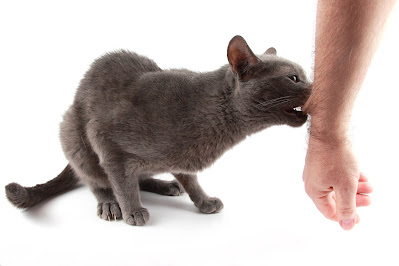What You Should Do for a Cat Bite or Scratch
Act quickly to cut your infection risk
First, you want to try to flush out as much bacteria as possible and then irrigate the wound with water.
Next, wash the wound with mild soap and water. Slow the bleeding with a clean cloth and apply over-the-counter antibiotic cream if you have it. Then, wrap the wound in a sterile bandage. Keep the wound bandaged until you see your doctor.
“After you see your doctor, change the bandage several times a day,” he says. “Watch for signs of infection, including redness, swelling, increased pain and fever.”
 |
| What to do if a Cat bites you |
Infections cats can pass along
Cats can introduce staphylococcus aureus, campylobacteriosis or pasteurella bacteria into your body.
Staphylococcus aureus is commonly found on the skin of humans and animals and is spread between humans and animals through touching, according to the Centers for Disease Control and Prevention (CDC). Be aware that cats don’t often show signs of this infection, so it may be hard to tell just by looking at it.
People can contract the campylobacter infection by coming into contact with an infected cat’s poop or through contaminated water or food. If you contract the campylobacter infection, symptoms may include stomach cramps, fever, nausea and diarrhea.
“If you contract pasteurella bacteria after a cat bites or scratches you, initial signs of infection can appear in a few hours,” says Dr. Sayles. “Hands, joints and tendons are at greatest risk.”
People can also contract cat scratch fever, also called cat scratch disease (CSD). This comes from cats infected with Bartonella henselae bacteria from flea bites, blood transfusions or fighting with other infected cats. A bite, scratch or even the saliva of an infected cat can pass it along.
While it may be difficult to avoid petting unfamiliar cats (who can resist those sweet meows?), the CDC recommends being cautious with them, even if they seem friendly. This will help decrease your risk of contracting an infection. Always remember to wash your hands after touching or playing with a cat and after cleaning their litter box.
How a doctor treats a cat wound
“Cat wounds most often are left open to heal,” says Dr. Sayles. “This makes cleaning the wound easier for you and reduces infection risk.”
Your doctor will likely do the following:
Clean the wound again and apply antibiotic ointment.
Prescribe antibiotics, such as Augmentin, if there’s an infection concern.
Give you a booster shot if your tetanus vaccine is out-of-date.
Determine whether the wound needs stitches.
Remember, it’s important to act quickly if you get a cat bite. Call your doctor as soon as possible to help cut the risk for infection.
